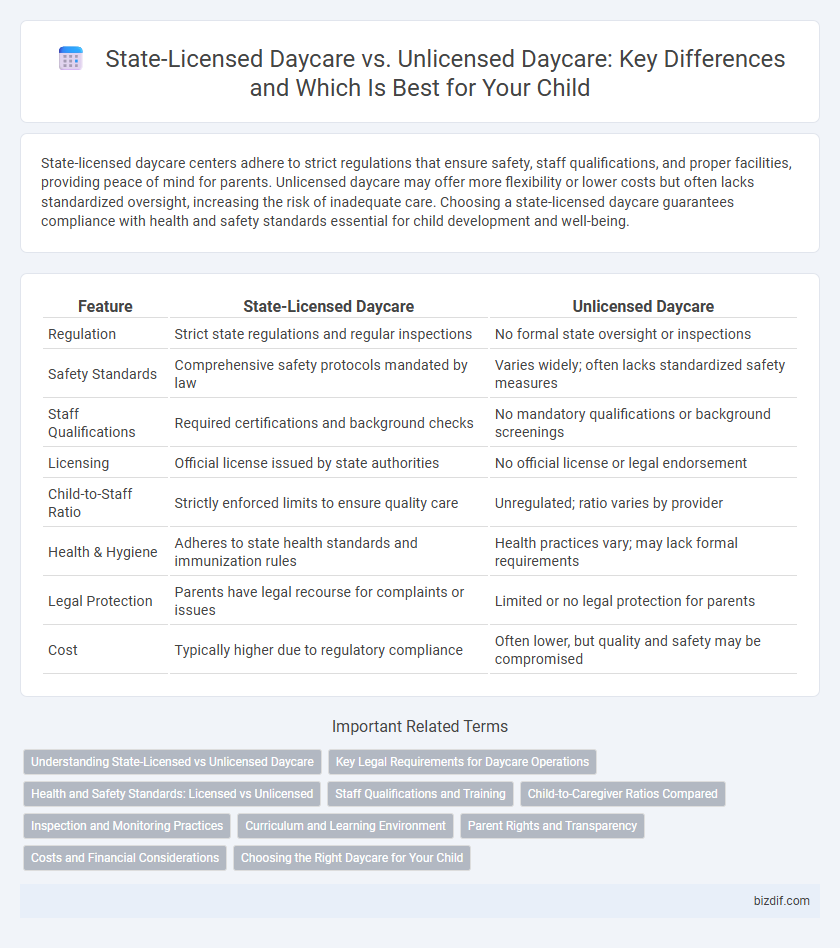State-licensed daycare centers adhere to strict regulations that ensure safety, staff qualifications, and proper facilities, providing peace of mind for parents. Unlicensed daycare may offer more flexibility or lower costs but often lacks standardized oversight, increasing the risk of inadequate care. Choosing a state-licensed daycare guarantees compliance with health and safety standards essential for child development and well-being.
Table of Comparison
| Feature | State-Licensed Daycare | Unlicensed Daycare |
|---|---|---|
| Regulation | Strict state regulations and regular inspections | No formal state oversight or inspections |
| Safety Standards | Comprehensive safety protocols mandated by law | Varies widely; often lacks standardized safety measures |
| Staff Qualifications | Required certifications and background checks | No mandatory qualifications or background screenings |
| Licensing | Official license issued by state authorities | No official license or legal endorsement |
| Child-to-Staff Ratio | Strictly enforced limits to ensure quality care | Unregulated; ratio varies by provider |
| Health & Hygiene | Adheres to state health standards and immunization rules | Health practices vary; may lack formal requirements |
| Legal Protection | Parents have legal recourse for complaints or issues | Limited or no legal protection for parents |
| Cost | Typically higher due to regulatory compliance | Often lower, but quality and safety may be compromised |
Understanding State-Licensed vs Unlicensed Daycare
State-licensed daycare centers comply with government regulations ensuring safety, staff qualifications, and child-to-caregiver ratios, which enhances child protection and quality of care. Unlicensed daycare providers operate without official oversight, potentially lacking standardized safety measures and formal training requirements. Choosing a state-licensed daycare offers verified accountability and regulatory compliance essential for parents prioritizing child welfare and development.
Key Legal Requirements for Daycare Operations
State-licensed daycare centers must comply with rigorous legal requirements including health and safety standards, staff-to-child ratios, background checks for caregivers, and regular inspections to ensure child well-being. Unlicensed daycare facilities often operate without these mandatory regulations, which can result in inconsistent safety measures and lack of formal oversight. Licensing ensures accountability, adherence to state laws, and provides parents with assurance regarding the quality and security of care.
Health and Safety Standards: Licensed vs Unlicensed
State-licensed daycare centers strictly adhere to health and safety standards set by regulatory authorities, including regular inspections, staff background checks, and mandatory training in first aid and child CPR. Unlicensed daycare facilities often lack formal oversight, which can result in inconsistent safety practices and an increased risk of health hazards for children. Parents seeking reliable care should prioritize licensed daycares to ensure a secure environment that complies with state-mandated regulations.
Staff Qualifications and Training
State-licensed daycare centers are required to employ staff with verified qualifications, including certifications in early childhood education and regular training in child safety and development, ensuring a higher standard of care. Unlicensed daycare providers often lack mandatory credentialing and standardized training, which can result in inconsistent staff expertise and potentially lower quality supervision. Parents seeking reliable care should prioritize facilities with licensed educators to guarantee trained personnel and adherence to state-mandated safety protocols.
Child-to-Caregiver Ratios Compared
State-licensed daycares adhere to strict child-to-caregiver ratios mandated by regulatory agencies, often limiting groups to 6 children per caregiver for infants and slightly higher for older children, ensuring personalized attention and safety. Unlicensed daycares typically lack these regulated limits, which can result in higher child-to-caregiver ratios and potentially decreased supervision quality. Maintaining lower ratios in licensed facilities supports better developmental outcomes and adherence to safety standards mandated by state authorities.
Inspection and Monitoring Practices
State-licensed daycare centers undergo regular inspections by government agencies to ensure compliance with health, safety, and staff qualification standards, providing a structured framework for monitoring. In contrast, unlicensed daycare facilities typically lack mandated oversight, which increases the risk of inconsistent safety practices and unverified caregiver qualifications. Parents seeking reliable childcare should prioritize licensed centers where systematic inspections and continuous monitoring enforce accountability and protect child welfare.
Curriculum and Learning Environment
State-licensed daycare centers follow regulated curricula designed to support early childhood development with structured activities that promote cognitive, social, and emotional growth. Unlicensed daycares often lack standardized educational frameworks, resulting in inconsistent lesson plans and learning environments. The licensed facilities maintain child-to-staff ratios and educational standards that ensure a safe, enriched atmosphere conducive to learning and development.
Parent Rights and Transparency
State-licensed daycare centers adhere to strict regulatory standards ensuring safety, staff qualifications, and transparent communication, which empower parents with clear rights to access records and participate in care decisions. Unlicensed daycare providers may lack standardized oversight, often resulting in limited transparency about childcare practices and fewer formal avenues for parents to voice concerns or review operational compliance. Prioritizing licensed facilities enhances parental confidence through enforced accountability and access to crucial information regarding their child's well-being.
Costs and Financial Considerations
State-licensed daycare centers typically have higher costs due to regulatory compliance, staff training, and facility standards that ensure safety and quality care. Unlicensed daycare options often offer lower fees but lack formal oversight, which can lead to variable care quality and potential legal risks. Evaluating financial considerations requires balancing affordability with the assurance of regulated, secure environments provided by state-licensed facilities.
Choosing the Right Daycare for Your Child
State-licensed daycare centers adhere to strict safety, health, and staffing regulations, ensuring a secure environment for your child compared to unlicensed facilities, which may lack standardized oversight. Choosing a licensed daycare provides peace of mind through consistent quality, regular inspections, and qualified caregivers trained in early childhood development. Prioritizing state-licensed options supports your child's well-being, social growth, and long-term cognitive development.
State-licensed daycare vs Unlicensed daycare Infographic

 bizdif.com
bizdif.com